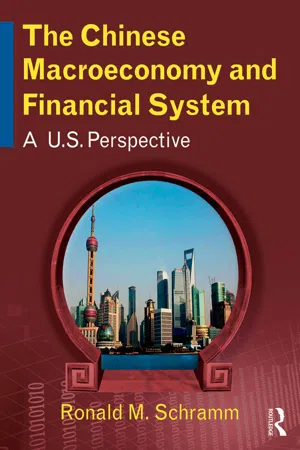Economics
Savings and the Financial System
Savings refers to the portion of income that is not spent and is instead set aside for future use. The financial system encompasses institutions, markets, and regulations that facilitate the flow of funds between savers and borrowers. It plays a crucial role in allocating savings to productive investments, thereby contributing to economic growth and development.
Written by Perlego with AI-assistance
Related key terms
1 Key excerpts on "Savings and the Financial System"
- eBook - ePub
The Chinese Macroeconomy and Financial System
A U.S. Perspective
- Ronald M Schramm(Author)
- 2015(Publication Date)
- Routledge(Publisher)
Given the accounting identity above, a change in disposable personal income would exactly be matched by a change in savings for any given level of consumption. Moving from accounting to theory, the Keynesian approach posits consumption being positively related to disposable personal income as is savings. As we shall discuss later, from a theoretical perspective, savings and consumption are more likely to be directly related to disposable personal income when constraints exist on spending current wealth, or borrowing against current wealth or future income. Classical economists had earlier emphasized the role of interest rates in determining savings since income was generally taken as a given at full employment. In the event, disposable personal income, interest rates, and consumption are three key variables that both theoretically and empirically help to determine the level of savings.Life Cycle, Permanent Income, and Wealth EffectsMore modern theories emphasize the role of savings as a means to an end—where the ultimate goal is a smooth pattern of consumption over either a finite horizon (typically an assumed lifetime) or an infinite horizon for a representative agent. These theories of savings emphasize savings in its role as smoothing consumption either in the short term or the longer term. In other words, savings act as a buffer to either unanticipated shocks to income or anticipated long-run changes in income. Most important to consider are the types of income (temporary or permanent) and the actual or projected income earned by different demographic groups for a given economy. This approach allows for more comprehensive theories of savings. Temporary changes in income have a smaller impact on consumption than do permanent changes (Friedman’s permanent income hypothesis (PCH)) and so, for example, a temporary increase in income will tend to be saved—so as to maintain a smooth (balanced) consumption pattern over time. This approach helps explain the smoothing of consumption over the short run when income experiences random shocks.In Modigliani’s life cycle hypothesis (LCH), an individual recognizes three ages of man— youth, working age, and retirement.5
Learn about this page
Index pages curate the most relevant extracts from our library of academic textbooks. They’ve been created using an in-house natural language model (NLM), each adding context and meaning to key research topics.
